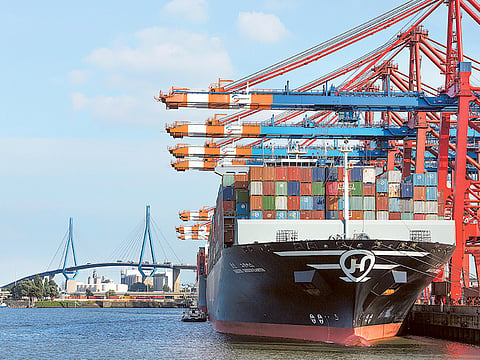Attention US trade warriors, Germany’s surplus is on the wane
Pensioners, homebuyers and immigrants are quietly working to bring the $297 billion current-account surplus down

BERLIN: The Trump administration appears intent on escalating the long-standing US practice of attacking Germany’s current-account surplus.
Good news for those on the receiving end: It has probably peaked.
As officials like National Trade Council director Peter Navarro rail against the trade imbalance that dominates the balance of payments between the two countries, pensioners, homebuyers and immigrants are quietly working to bring that $297 billion current-account surplus down.
According to research by Deutsche Bank, demographics and a housing boom are two factors that will drive the current account balance — the difference between what a country earns from abroad and what it spends — to its lowest level in seven years by 2020.
That may offer little consolation to the German delegation when it hosts a Group of 20 meeting of finance ministers in March, as they’ll likely face intensified criticism for allowing such an imbalance to continue. Germany has long faced flak, both within the euro area and outside it, for failing to encourage greater domestic spending and imports to balance out its external excess.
Still, while the weaker euro will continue to make German exports attractive in the US — think expensive sedans, high-tech machinery — there are countervailing factors at play on the other side of the equation.
“In the medium term we expect the demographic development and the solid domestic economy, driven by a sustained positive development on the property market, to push the surplus down to 7 per cent of GDP,” Deutsche Bank economist Heiko Peters said by phone.
A rising share of pensioners in the German population, who normally have less money to save than people in jobs, will crimp household savings rates, while an increasing number of immigrants such as refugees will contribute to boosting German imports, Peters wrote in a study first published last year.
And with housing valuations outpacing income and rent growth since 2009, home owners feel richer, save less toward retirement and borrow against their property. That leads to rising imports of building materials to fuel the property boom and increased demand for foreign consumer goods on the back of the wealth effect.
Seven per cent of GDP is still a mighty big number for an economy as large as Germany’s.
“That’s still a relatively high level until 2020,” Peters says. “But an even greater demographic effect is then expected for 2020-2025, and the surplus should then decline clearly further.”
Sign up for the Daily Briefing
Get the latest news and updates straight to your inbox



